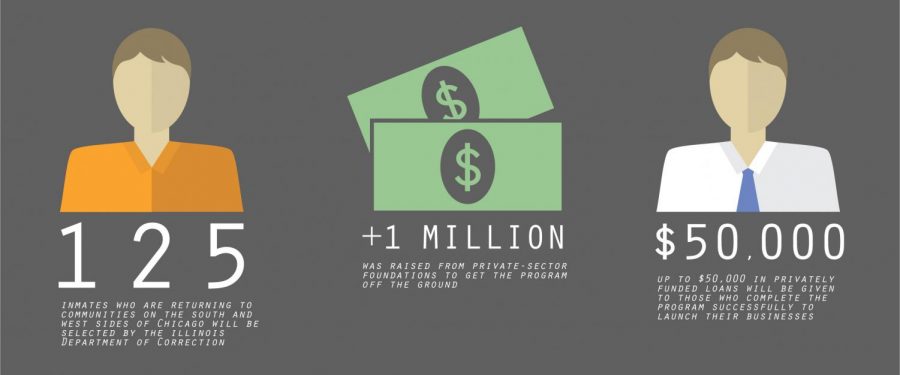Pilot program grants inmates business training
Pilot program grants inmates business training
November 20, 2017
Illinois is giving former inmates a second chance at success with a new program aimed at sharpening business skills.
The Illinois Department of Corrections will screen 125 candidates for a pilot program, Pathway to Enterprise for Returning Citizens, which will give former inmates comprehensive business training upon their release. Those who complete the program are eligible to receive up to $50,000 in loans to jump-start any future business ventures.
Funding for this program was made available with donations from various businesses, such as Citibank Foundation, the Chicago Community Trust, the Perry Family Foundation, U.S. Bank and the Hughes Foundation.
“Recovery programs are utterly essential in prison,” said Robin Casarjian, executive director at Lion Heart Foundation—a nonprofit organization dedicated to providing social learning programs to incarcerated adults. “The more self-confidence [inmates] have, the more skills they have to manage the stress that they are inevitably going to deal with, the more likely they are to succeed when they are out in the community.”
The program comes after Gov. Bruce Rauner created a five-year pilot program that improves inmates’ life skills by training them on how to prepare a budget, write a business plan and set realistic goals while building interpersonal relationship skills.
Since Rauner took office in January 2015, the Illinois’ prison population decreased 12 percent, according to a Nov. 6 press release from the governor’s office.
More than 60 percent of ex-inmates are unemployed one year after being released, according to a 2012 Society for Human Research Management study. Moreover, a 2010 study by the Pew Research Center showed employed inmates make 40 percent less a year than coworkers in their field.
“These people have families to feed and bills to pay, just like every other American. It doesn’t mean they should be second-class citizens,” said David Figueroa, former inmate and owner of Second Chance Renovations, an company that employs and trains former inmates in the carpentry field.
Before Second Chance Renovations, Figueroa struggled to find work after his release because his previous criminal record would scare away potential employers.
“Even though I was one of the best workers [at the job], I was let go [solely] because of my criminal background,” Figueroa said.
Many former prisoners who are back in society lack basic skills needed to be succeed and run a business, according to a 2016 IDOC report.
The Department of Corrections administers the Test of Adult Basic Education to prisoners when they arrive to assess the education level for inmates. Of the 13,356 offenders in 2016 who were serving more than two years except life sentences, 4,945 offenders scored below a sixth-grade education level on the TABE test, according to the 2016 report.
Former inmates will need more than being set free to contribute to society again, said Peter Leonard, owner and founder of Second Chance Coffee Company in Wheaton, Illinois. If inmates lack direction in life, they could fail, he added.
“It’s going to take more than money, and more than working at a company for a number of months [for inmates to succeed],” Leonard said. “If you’ve been institutionalized—anything more than five years—when you get out, your ability to think non-institutionally is dramatically diminished.”








